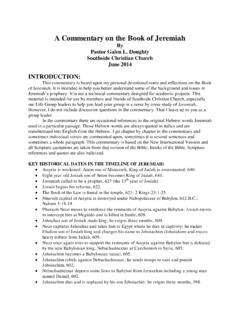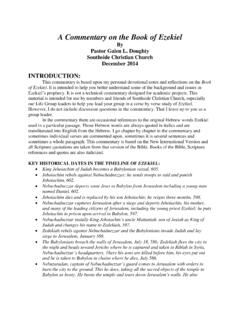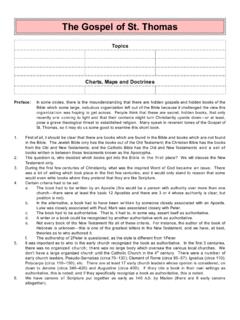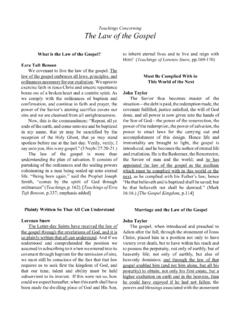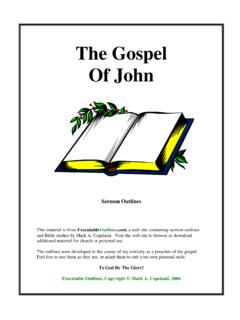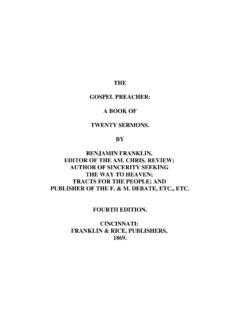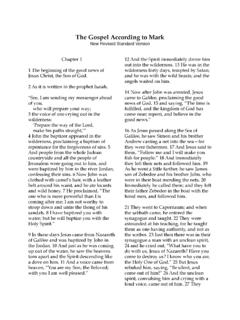Transcription of A Commentary on the Gospel of Luke - Southside …
1 A Commentaryon the Gospel of LukeByPastor Galen L. DoughtySouthside Christian ChurchFebruary 2013 INTRODUCTION:This Commentary is based upon my personal devotional notes and reflections on theGospel of Luke. It is intended to help youbetter understand some of the background and issuesin Luke s Gospel . It is not a technical Commentary designed for academic projects. This materialis intended for use by members and friends of Southside Christian Church, especially our smallgroup leaders to help youlead your group in a verse by verse study of the , I donot include discussion questions in the Commentary . That I leave up to you as a group few things need to be noted. There are occasional references tothe originalGreekwordsLuke usedin a particular passage. Those Greek words are always quoted in italics and aretransliterated into English from the Greek. I go chapter by chapter in the Commentary andsometimes individual verses are commented upon,sometimes itisseveral sentencesandsometimesa whole Commentary is based on the New International Version andall Scripture quotations are taken from that version of the should also be noted that Iowe many of my own insights in Luke s Gospel to Dr.
2 Ken Bailey a professor of mine at FullerTheological Seminary and one of the world s leading scholars on the parables of Jesus and theMiddle Easterncultural background of the New hope and pray you will find this resource usefulfor your own study and also for yoursmall group. I also hope that it will help grow your love and respect for God s Word, the Bibleand help motivate you to study it more so that you may come to know its author, our Lord JesusChrist!Pastor Galen DoughtyBriefOutline of Luke:Prologue 1:1-4 The Infancy Narratives 1:5-2:52 The Ministry of John the Baptist 3:1-20 The Beginning of Jesus Ministry 3:21-4:13 Jesus in Galilee 4:14-9:50On the Way to Jerusalem (The Travel Narrative) 9:51-19:27 Jesus in Jerusalem 19:28-21:38 The Passion of Jesus (arrest, trial, crucifixion, death and burial) 22:1-23:56 The Resurrection of Jesus 24:1-53 Chapter 1:Luke 1:1-Luke is the only Gospel writer that gives us clues into how he wrote his Gospel and thesources he used for his writing.
3 He is not an eyewitness but was a companion of Paul that joinedthe apostle on his second missionary journey. He was a Greek from Philippi or Troas who wasalso a physician. Luke is one of the only oneswith Paul during his imprisonment in Caesarea andin Rome. Since he was a physician it is reasonable to assume he took care of Paul during his2trials. Paul hints at the fact that he had some debilitating, chronic disease or medical condition inGalatiansand 2 Corinthians. Luke might have stayed near him to help him deal with hiscondition and the rigors of was with Paul when he came to Jerusalem for the final time. Acts suggests he wasalso with Paul through his two year imprisonment in Caesarea. It is possible that during that timeLuke begins his research into writing a Gospel and interviews many of the eyewitnesses whowere living in Palestine during this time. He probably talked with Phillip the Deacon who livedin Caesarea and perhaps some from the household of Cornelius.
4 During that two year period hemost likely talked with Mary if she was still in Judea or Galilee at the time, gathering hismaterial for his birth narratives. The early accounts of Jesus' life almost certainly have Mary astheir primary source. Nothing else makes states very clearly that he was not the first person to write an account of Jesus' life,death and references from Paul s letters help corroborate Luke s 4:10: Mark is now with Paul in Rome. That puts Mark in Rome at least by 60and possible as early as 58. Luke also is with Paul. That means Mark and Luke knew each otherand almost certainly were comparing notes in regards to the accounts of Jesus each was Peter in Rome already too? Had Mark already finished his Gospel ? Did he show a draft toLuke, who then used it in his Gospel as well? We don't know the details but the clues arefascinating and give us a picture of how the gospels came to be written. God not only inspiredthe writers he was in the details of the gathering of their sources.
5 The fact that Markand Lukemet in Rome during Paul's imprisonment is significant!Philemon 24: Mark and Luke are together in Rome with Paul around 60-62. It cannot becoincidence that Luke writes of the many who undertook a Gospel or that the two Gospel writerswere together or that Luke borrowed heavily from Mark as a source and outline for his Gospel !What conversations did they have with each other, with Paul or even Peter if he was now inRome? We will never know but the clues suggest that Mark was written before Acts was finishedwhich means his Gospel was written as early as 58 or 60 before Paul arrived with Luke in :2-Luke uses the phrase, eyewitnesses and servants of the word. The Greek word ishuperates,which means attendant, servant, and literally assistant rower, because it comes from the verb torow a boat. It was used of the synagogue attendant who was the bouncer, janitor and keeper ofthe Scripture scrolls. He was the chief assistanttothe president of the synagogue.
6 Here thehuperatesis the keeperof the Word of Jesus and was also an eyewitness. They were the keepersof the tradition of the Jewish-Christian synagogues, those who followed Jesus as their would insure that the words and deeds of Jesus were preserved correctly and were rightlyrecited when they were shared in the synagogue. They werethekeysto the identity and survivalof the Jewish-Christian synagogues because they helped preserve the identity of who the peoplewere, who their Messiah was and what he did and said. Without them stories could too easilyhave been made up or changed too radically and the life and ministry of Jesus would have beenlost which would have led to the destruction of the Jewish-Christian community. Thosesynagogues were a key part in accurately preserving the tradition of what Jesus said and did andthe meaning of itall. They used the cultural tools they knew to pass down orally what Jesus diduntil it could be written down and preserved for people outside Judea.
7 That is what Luke wasdoing and that is why he used thehuperatesas one of his primary :3-Luke says he carefully investigated everything from the beginning. He begins his gospelwith the birth announcement of John the Baptist, going back further than Mark, and even furtherthan Matthew. The careful investigation implies his interviews with eyewitnesses and hisgathering of source materials, perhaps sayings of Jesus or even the"Travel Narrative"(Luke9:51-19:27). The most likely time he gathered this material was during Paul's imprisonment atCaesarea where Luke would have had access to Jewish Christians who knew Jesus and theMessianic Jewish synagogues where Jesus' sayings and deeds were recited and was led through his investigation to write down an account as well for his mentorand probably for the many Greek speaking Christians in the Gentile churches of Asia Minor andGreece. What finally led him to decide to write a Gospel we cannot say, except to note that theHoly Spirit was active in his investigations and his decision to write his was probably his patron who underwrote the expense of Luke's writing andpublishing.
8 He was a Christian and probably a Roman official, which explains the honorific title,most excellent or your Excellency. His name means lover of God, which could be a code namefor a more well-known Roman official. Luke might have used Theophilus as a cover to hide theidentity of a Roman Christian who needed to be careful of being so public in his faith given thesituation with Nero and his increasing paranoia and opposition to :4-Luke tells Theophilus he writes so that Theophilus will know the certainty of what he hadbeen taught. In otherwords Luke writes to show Theophilus that these are not myths he hasbelieved. Jesus was a real historical figure who lived, died and roseagain. He is truly the Lord ofall and our Savior. We can have complete confidence that the stories of the gospels are true. Hewrites to convince Theophilus and his readers that Jesus is who he claimed to be, the Son of Godand that the invitation of forgiveness that he extends to all who believe is real and :5-10-Luke begins his narrative with the birth announcement of John the Baptist.
9 Heintroduces us to Zechariah a priest who was of the priestly division of Abijah. 1 Chronicles 24describesthe process where the priests by family groups were divided into their divisions inorder to know whose turn it was to serve in the temple. It was all based on a rotating schedule byfamilies. Abiathar was a son of Ithamar son of Aaron. He was eighth in line for the rotation. Thepoint is there was nothing out of the ordinary about Zechariah. He was a priest in the normaltemple service rotation. He probably lived in a nearby town in Judea and traveled to Jerusalemwhen it was time for his service, stayingin the temple until his ministry was tells us Elizabeth his wife was also a descendant of Aaron, which meant she was ofa priestly family as well, but she was barren. In that time that would have been seen as a cursefrom God upon them. Itwould have been common for people to believe either they sinned ortheir parents did and that was the reason Elizabeth could not have children.
10 Luke counteracts thatidea by saying they were both upright before God, observing all the Lord's commandmentsblamelessly. They were now advancing in years and the implication is Elizabeth is past herchildbearing sets the time of John's birth announcement in the reign of King Herod of puts it sometime before 4 goes into thetemple to serve because it was his division's turn to serve and thelot had fallen to him. His task that day was to burn incense and offer prayers at the altar ofincense before the veil of the holy of holies in the holy place of the temple. The worshippers hadgathered outside in the court where the sacrifices were performed as Zechariah went into the4temple to perform his duties. This was probably either at the morning or evening sacrifice andprayers. Zechariah goes in to pray while the people pray outside. He is apparently the only priestin the holy :11-17-Zechariah is performing his duties, offering prayers before the altar of incense, whenan angel of the Lord suddenly appears right next to the altar of incense.
